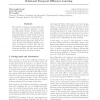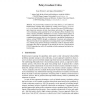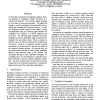13 search results - page 2 / 3 » Reinforcement Learning in Distributed Domains: Beyond Team G... |
ATAL
2004
Springer
13 years 10 months ago
2004
Springer
Product Distribution (PD) theory is a new framework for controlling Multi-Agent Systems (MAS’s). First we review one motivation of PD theory, as the information-theoretic extens...
ICML
2006
IEEE
14 years 5 months ago
2006
IEEE
We introduce relational temporal difference learning as an effective approach to solving multi-agent Markov decision problems with large state spaces. Our algorithm uses temporal ...
AAMAS
2005
Springer
13 years 4 months ago
2005
Springer
Cooperative multi-agent systems are ones in which several agents attempt, through their interaction, to jointly solve tasks or to maximize utility. Due to the interactions among t...
ECML
2007
Springer
13 years 10 months ago
2007
Springer
We present Policy Gradient Actor-Critic (PGAC), a new model-free Reinforcement Learning (RL) method for creating limited-memory stochastic policies for Partially Observable Markov ...
IJCAI
2003
13 years 6 months ago
2003
In this paper we describe an integrated multilevel learning approach to multiagent coalition formation in a real-time environment. In our domain, agents negotiate to form teams to...



